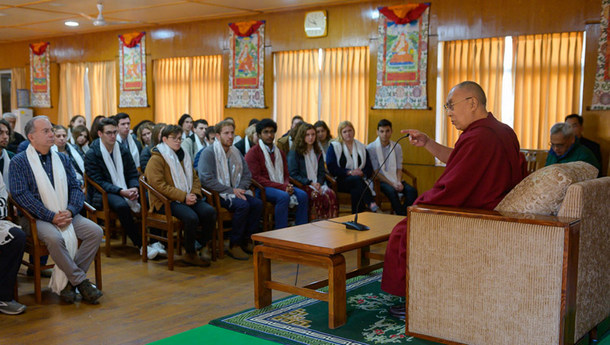Dharamshala, India — “Historically, according to Chinese documents, Tibet, Mongolia and China were independent nations in the 7th, 8th and 9th centuries,” His Holiness told a group of students from the USA and Israel. But he said: “However, the past is past. We need to take account of the reality today. We are not seeking separate status for Tibet."
On Thursday morning, January 28, 2019, His Holiness the Dalai Lama met with a group of 51 students and six staff members of Kivunim. This department of Hebrew College offers an academic gap year program for North American High School graduates based in Jerusalem with field trip visits to 11 other countries. His Holiness welcomed them to Dharamshala, India —his home for the last sixty years.
"All of us seven billion human beings are mentally, emotionally and physically the same,” he told them. “Whether you are a Muslim, a Jew, a Christian or belong to any other faith, there is no difference in the way we are born or the way we die. We begin our lives basking in our mother’s affection, without which we would not have survived.
“Scientists have evidence that basic human nature is compassionate. They have also found that the opposite, constant anger and hatred, weaken our immune systems. Therefore, just as we teach physical hygiene to preserve our physical health, in order for people to learn how to maintain a happy, peaceful mind, they need to learn emotional hygiene—how to tackle their destructive emotions.”
His Holiness explained that he is committed to promoting basic human values because of his concern that people should be able to lead their lives in joy and peace. In this connection he is also committed to encouraging religious harmony because, despite differences in their philosophical views, all major religious traditions convey a similar message of love and compassion, patience and tolerance and so forth. He acknowledged that belief in a merciful creator God is a powerful basis for viewing our fellow creatures as brothers and sisters. Being responsible for your own actions, as taught among non-theistic traditions, has a similar effect.
His Holiness mentioned how sad he feels to see conflict in the name of religion: "Religion is supposed to bring people closer together, so it’s unthinkable that it should be used to create conflict. It is particularly sad when members of different denominations of the same religion, such as Sunni and Shia Muslims, quarrel with each other, however this doesn’t seem to be a problem in India.”
Although he has retired and passed his political responsibilities to an elected leadership in 2011, His Holiness told them that he remains deeply concerned about keeping Tibet's rich culture and language alive. "As far as the Nalanda tradition is concerned, its approach to reality, which depends on the use of reason, is scientific and unique among Buddhist traditions."
His Holiness answered several questions from the audience. Regarding the need to protect Tibet’s ecology, His Holiness reported that scientists have told him that because the natural environment at high altitude is more fragile, when it is damaged it takes much longer to recover.
“Historically, according to Chinese documents, Tibet, Mongolia and China were independent nations in the 7th, 8th and 9th centuries,” His Holiness remarked. “However, the past is past. We need to take account of the reality today. We are not seeking separate status for Tibet. We are prepared to remain with the People’s Republic of China (PRC), provided there is mutual benefit. I have great admiration for the spirit of the European Union that puts the common interest ahead of the interests of its individual members.”
The Chinese Communist totalitarian regime began their invasion of Tibet in 1949, reaching complete occupation of the country in 1959. Since that time, more than 1.2 million people, 20% of the nation's population of six million, have died as a direct result of China's invasion and occupation. In addition, over 99% of Tibet's six thousand religious monasteries, temples, and shrines, have been looted or decimated resulting in the destruction of hundreds of thousands of sacred Buddhist scriptures.


![Tibet has a rich history as a sovereign nation until the 1950s when it was invaded by China. [Photo: File]](/images/stories/Pics-2024/March/Tibet-Nation-1940s.jpg#joomlaImage://local-images/stories/Pics-2024/March/Tibet-Nation-1940s.jpg?width=1489&height=878)
















